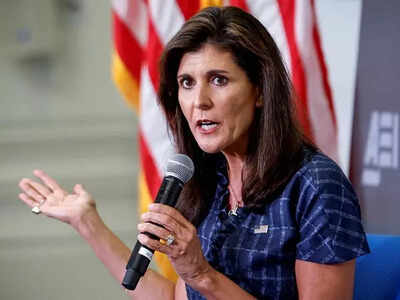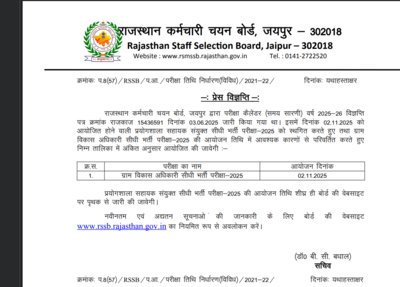Nikki Haley education qualifications: How the Indian-American Republican rose to become South Carolina governor and US ambassador to the UN

“India must take Trump’s point over Russian oil seriously,” Republican leader Nikki Haley said recently, urging India and the United States to work together to navigate trade tensions and energy issues. The Indian-American politician, who once served as the Governor of South Carolina and the US Ambassador to the United Nations, has been thrust back into global conversations, not only for her comments on tariffs and Russian oil but also as a symbol of the growing influence of Indian Americans in US politics. But behind her public persona lies a journey defined by determination, education, and an uncommon rise through political and civic ranks.
From Bamberg to the classroom: Early education and roots
Born Nimarata Nikki Randhawa on January 20, 1972, in Bamberg County, South Carolina, Haley grew up in a household shaped by education and ambition. Her parents, Ajit Singh Randhawa and Raj Kaur Randhawa, were immigrants from Amritsar, Punjab. Ajit, a scholar, became a professor at Voorhees College after completing his Ph.D., while Raj earned her law degree in India and later a master’s in education, teaching social studies in local schools.Education was more than a necessity in the Randhawa household, it was a value. Nikki began helping with bookkeeping in her mother’s boutique at the age of 12, learning early the importance of discipline, numbers, and responsibility. She attended Orangeburg Preparatory Schools and graduated in 1989, before pursuing a Bachelor of Science in Accounting and Finance from Clemson University, completing her degree in 1994. Her middle name, Nikki, meaning “little one” in Punjabi language, became the name she was widely known by, and a reminder of her humble beginnings.
Early career: Business, civic engagement, and leadership
After graduating, Haley briefly worked for FCR Corporation, a waste management company, before joining her family’s business as chief financial officer. She married Michael Haley in 1996 and began engaging in civic activities, from serving on local Chamber of Commerce boards to leading fundraising initiatives for hospitals and community projects. By 2003, Haley became treasurer of the National Association of Women Business Owners and later its president, cementing her reputation as a capable leader with organizational acumen.
Entering politics: A meteoric rise
Haley’s formal political career began in 2004 when she was elected to the South Carolina House of Representatives, serving three terms. Her early tenure was marked by pragmatism and a focus on state development. In 2010, backed by the Tea Party movement, Haley ran for Governor of South Carolina. The campaign was tumultuous; she faced racial slurs and personal attacks but emerged victorious, making history as the first female governor and only the second governor of Indian descent in the United States, after Bobby Jindal of Louisiana.During her governorship, she oversaw steady economic growth, a falling jobless rate, and, most notably, led the state’s response to the 2015 Charleston church shooting. Her decisive leadership in removing the Confederate flag from the State Capitol elevated her national profile and highlighted her capacity to navigate crises with both courage and empathy.
From state to international stage: US ambassador to the United Nations
In 2017, Haley was nominated by President Donald Trump as the United States Ambassador to the United Nations. Confirmed by the Senate with an overwhelming vote of 96 to 4, she became the first Indian American to serve in a Cabinet-level position. At the UN, she gained a reputation for being outspoken on key global issues, from defending Israel to criticizing North Korea’s nuclear ambitions and highlighting Russian interference in US elections. Her tenure also included overseeing America’s withdrawal from the Iran nuclear deal and the United Nations Human Rights Council — decisions that showcased her willingness to act decisively, even when controversial.
Presidential ambitions and beyond
In 2023, Haley launched her campaign for the 2024 Republican presidential primaries, positioning herself as a new-generation leader. She became the first female Republican to win a presidential primary with her victory in Washington, D.C., though she eventually suspended her campaign in March 2024. Following her political run, she joined the Hudson Institute as the Walter P. Stern Chair, continuing her influence in policy and international affairs.
Lessons from Haley’s journey
Nikki Haley’s trajectory from a small town in South Carolina to the global stage of the United Nations reflects a blend of education, resilience, and ambition. Her story underscores the impact of disciplined learning, civic engagement, and a readiness to seize opportunities. For students and aspiring leaders, Haley’s life illustrates that education is both a foundation and a springboard, one that, when paired with courage and vision, can transform local beginnings into national and international influence.Her path also serves as a reminder that in politics and life, credibility is built over years of consistent performance, and education — formal or experiential — is often the engine behind it. Haley’s rise demonstrates that preparation, combined with strategic risk-taking, can place even the most determined individuals at the center of global discourse.TOI Education is on WhatsApp now. Follow us here.





